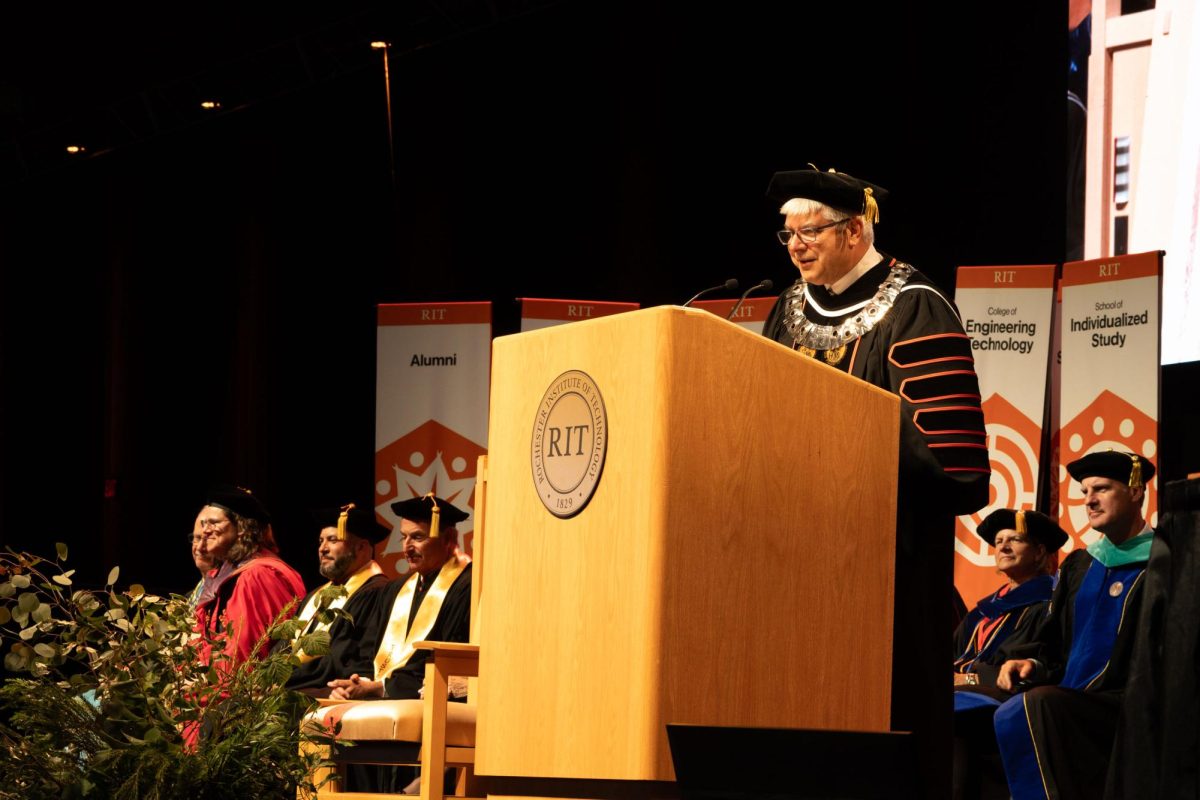On Feb. 1, 2024, students in RIT’s journalism bachelor’s program received an email announcing the decision to deactivate the major due to declining enrollment. Now, if an incoming student wants to pursue journalism, they need to choose the bachelor’s in communication with a specialization track in journalism. Current students in the program express concern about what this means for the future of journalism education at RIT, while several administrators see benefits.
Where Did This Begin?
This announcement came after a period of uneasiness among current journalism students. For over a year, they were aware that changes were looming for the program, but that was the extent of the communication provided. While the consensus is that the dwindling numbers were a clear signifier for this change, these students expressed feelings of disappointment and confusion about the sudden nature of this decision. They also wonder if this is just the first step in the gradual death of journalism at large at RIT.
Dr. Lauren Hall, the associate dean of Academic Affairs in the College of Liberal Arts (COLA), which housed the Journalism program, summarized how the administration came to this decision. According to her, during the college’s annual program review process, they noticed that journalism had been flagged for low enrollment for two years. The dean of the college at the time, Dr. Anna Stenport, tasked Hall to create a plan of action with faculty in the School of Communication.
“It was primarily the result of multiple iterative looks at the national landscape, as well as our regional competitors,” she stated. “It just didn’t make sense to try to do a full revamp of a [bachelor’s degree] when we could put it safely under communications.”
One concern among students was how the jump from changing the program to deactivating it altogether was handled. As of fall 2022, students were only aware of the pursuit of changes within the program, including options for a change in program title, to bring in more students. Hailey Fowler, a third year journalism student, recalled these feelings.
“We definitely saw it coming,” Fowler said, “but I will say it was a little blindsiding because the last we heard, the program was being restructured, and then all of a sudden, it’s gone.”
“The last [journalism students] heard, the program was being reconstructed, and then all of a sudden, it’s gone.”
How Does a Change Like This Happen?
The process of making changes in academic programs at this level involves many meetings and falls under many eyes, making it difficult to pinpoint where in the process student input is considered. It also did not help that the positions of dean of COLA and the provost both saw turnover during this period.
“We had this start-and-stop decision making, which made it difficult to communicate to students in a way that didn’t leave them with more uncertainty than they started with,” Hall stated.
While students understand the necessity of a reaction to declining enrollment, many believe that different methods of revitalizing the program could have been made.
“I think that had they provided more funding for the program and promoted it a little bit more, they would have seen growth,” said Madeline Lathrop, a recent journalism graduate. “But it takes time, I don’t think it would’ve been instantaneous. I think that it would’ve taken a while, and I don’t know if RIT had the patience for that.”
Additionally, the integration of RIT’s resources within the journalism program, among other COLA majors, falls behind that of other programs.
“If we go to a tech school and you’re going to have a college of liberal arts, it would be beneficial if you incorporate some of the things that tech students get into the curriculum of what [COLA students] could get as well,” said Nia Moore, another third year journalism student.
What’s Next?
Students who are currently enrolled and incoming fall 2024 students will see the same curriculum as expected. Meanwhile, students looking to enroll at RIT in the future will not find a bachelor’s in journalism option anymore, and that batch of students will witness the implementation of the journalism specialization track in the communication program if they choose it. According to Dr. Hinda Mandell, the journalism degree program director, this means that communication majors taking this track will get five core journalism classes as well as four additional classes that relate to their interests in journalism.
Students are concerned that moving to a specialization track will make the program even more hidden than it has been, discouraging students from viewing RIT as an option for journalism at all. Faculty as well show concern about this move. Hall commented, “I will say that the communications faculty were not happy about it, but it was a decision that both the dean’s office in liberal arts and the provost’s office felt made sense given the enrollments.” Despite this, certain administrators see this as an opportunity for students in other fields to develop an interest in journalism and pursue journalistic activities on and off campus.
While the number of students majoring in journalism has decreased over the years, journalism classes remain a popular option for general education electives. As a professor, Mandell sees this trend firsthand.
“Our journalism courses are very popular on campus and the courses almost always fill,” Mandell explained. “There is a really strong demand from students who are interested to learn about the foundations of journalism in the U.S.”
Administration also sees this change as an opportunity for innovation in the field of journalism without the restrictions that come with a full degree program. The current Provost, Dr. Prabu David, expressed optimism in his letter to journalism students. Dr. David was unable to provide a comment.
“For a BS degree, every time we change it, we have to go back to the state and it’s a bureaucratic nightmare, at least for substantial changes,” Hall stated. “Whereas with a specialization, the program has the ability to change as rapidly as the field is changing.”
“With a specialization, the program has the ability to change as rapidly as the field is changing.”
Hall contends the changes will give the program a new degree of flexibility: “It’ll make it easier for the faculty to respond to student interests and the things that students are excited about.”
Both Hall and Mandell put heavy emphasis on their desire to ease student worries and convey the school’s commitment to maintaining stability for those already in the program. On the other hand, students have already experienced the shortcomings that they believe contributed to the program’s deactivation. They express valid fear for what the program will look like for the students that come after them. For now, the details of the specialization track are not set in stone, and there is a cloud of anticipation that resides over the future of journalism at RIT.









